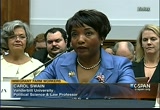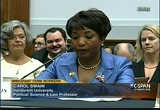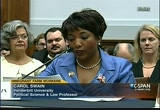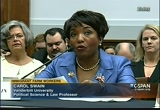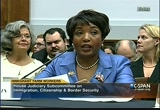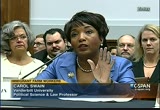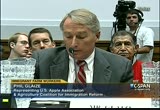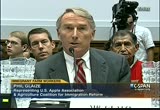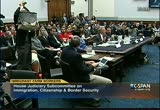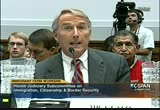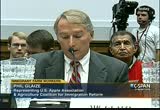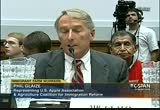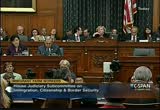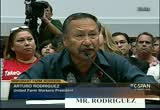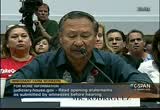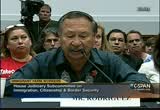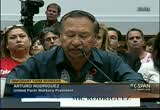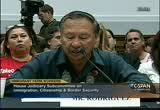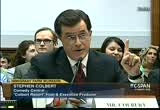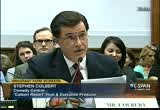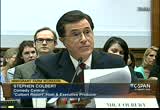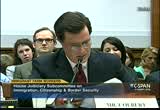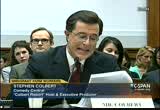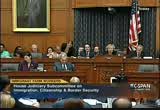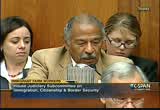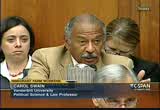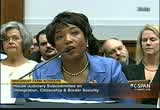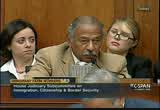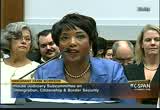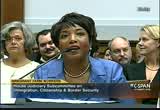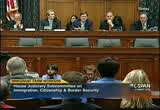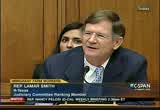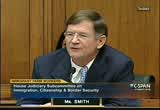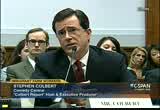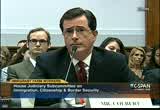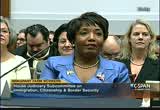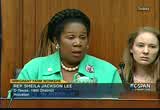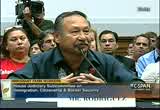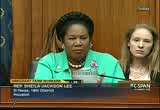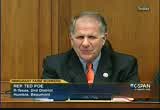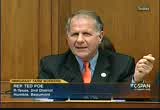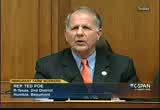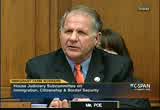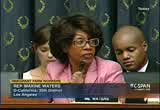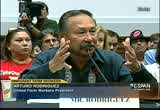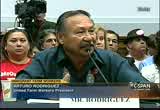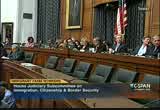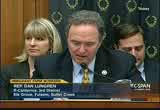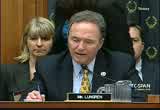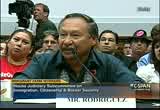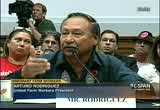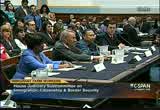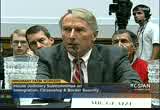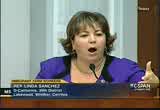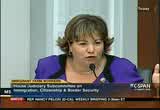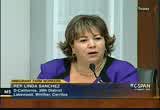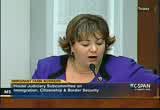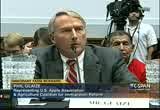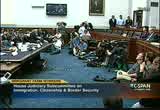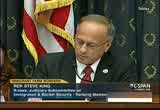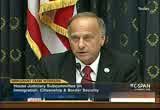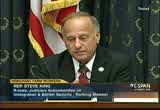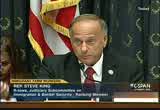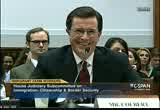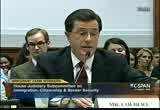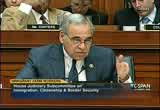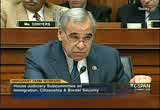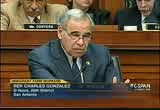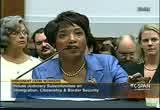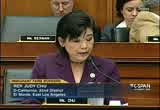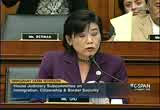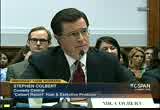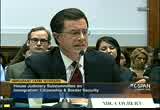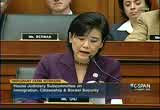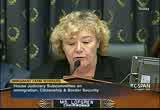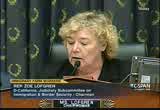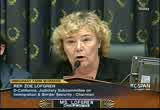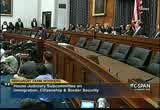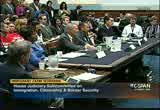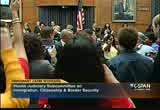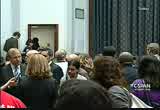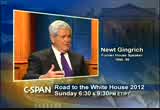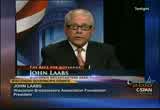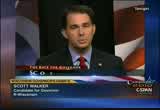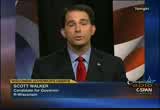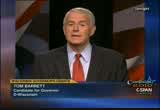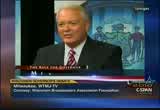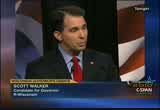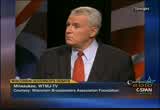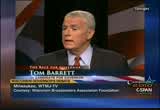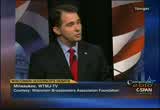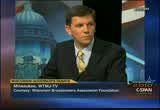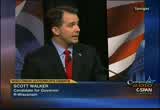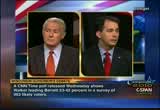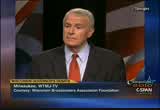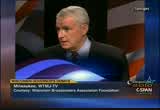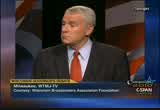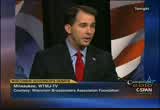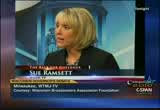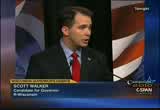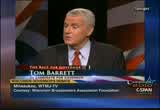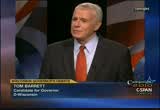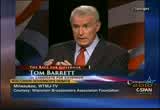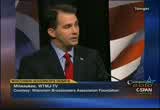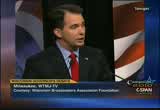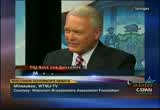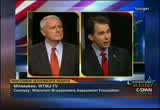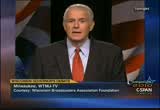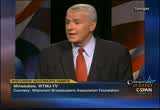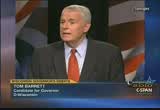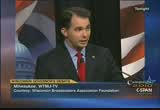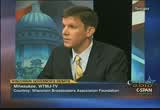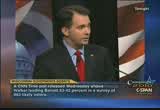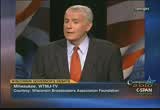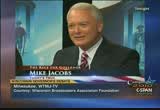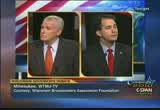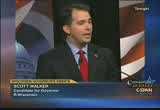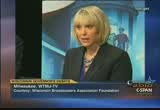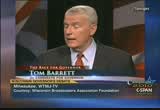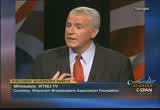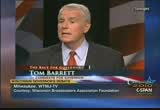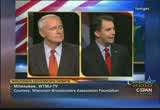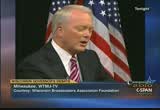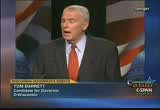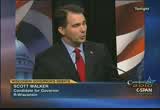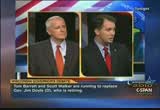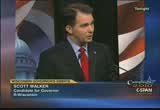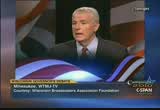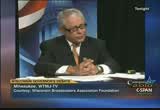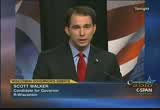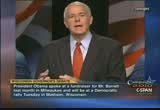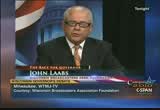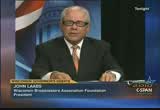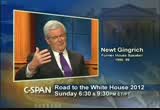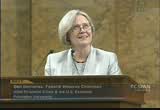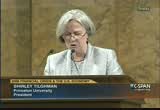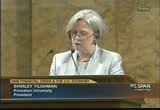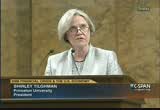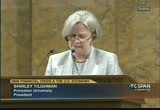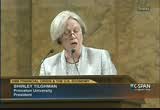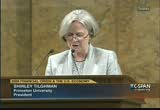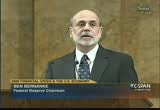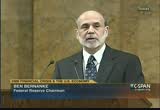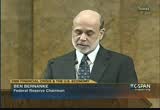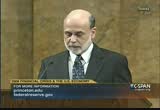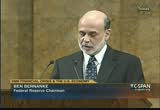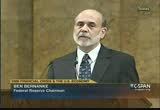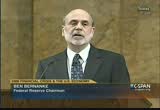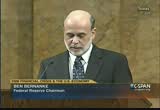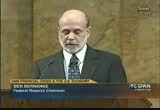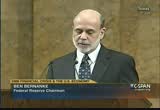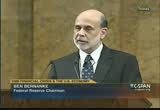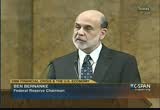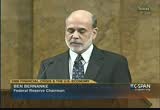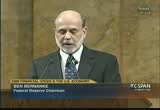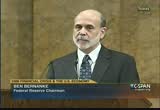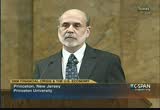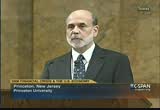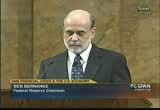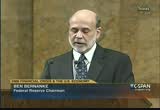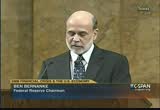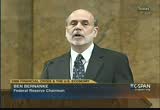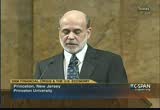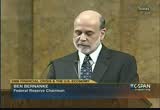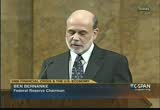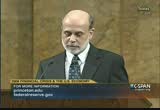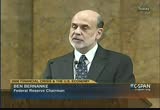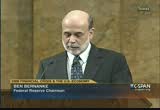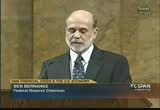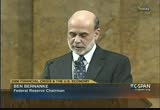tv Capital News Today CSPAN September 24, 2010 11:00pm-2:00am EDT
11:00 pm
like to ensure a steady supply of cheap labor and bypass existing programs. a labor economist who has conducted extensive studies of farm labor has found a rise in production and a stagnant wawages for workers. if there were labor shortages for agricultural workers, one would expect to find rising wages and more attractive working conditions. one would not expect to find an unemployment rate of 10.8% in may and 7.9% in august. these figures indicate that there are native workers actively seeking employment in
11:01 pm
agriculture, forestry, fishing and hunting. the majority of these workers have less than a high-school education. they work under the most strenuous conditions. there is a high turnover rate among these workers. agricultural workers often leave the farms or other low-wage, low skill occupations. there they compete directly with low skill americans for a dwindling supply of low-wage jobs. the "take our jobs" initiative entirely misses the point. america cannot continue to bring in low-skilled guest workers to compete with the most disadvantaged americans, the poor whites, blacks, legal hispanics, and others whom are here legally. nor can it continue to turn a blind eye to illegal immigration.
11:02 pm
often migration into the field migrates into other industries. without illegal labor, employers would be forced to pay higher wages and improve substandard working conditions. instead of paying $8 or $9 per hour, employers might be forced to pay $12 or $13. an increase in the wages of farm workers would not substantially increase the average family's food bill. the average family's food bill would rise by about $8 per year. the take our jobs initiative mrs. the fact that in some parts of the country, native workers have successfully worked alongside immigrants. yesterday, i had a conversation with a businessman from nashville who ran a one-year experiment in arkansas involving sweet potato planting and harvesting. he invested over a quarter of a
11:03 pm
million dollars of his own money to help unemployed americans get jobs in the field in an area of the country where unemployment is around 40% for african americans. his experiment involved the agricultural workers who are and a native-bornisas blacks. they were picked up, transported to the site, provided with facilities and at decent wage. he noted no difference in the quality of work provided by the native-born black workers, and concluded that americans would do farm work if they had transportation and decent working conditions. even though he had a program that was providing jobs for unemployed americans, he could not get state or federal agencies to make an investment in this program. he would like to see an
11:04 pm
independent farm services company created to stand between the workers and the growers. they would hire the workers, provide air-conditioned transportation, buses, a bathroom facilities, and served as a middleman between the bathroom workers and the growers. the "take our jobs" initiative has not made an effort to recruit american workers. this is a publicity stunt. we need to reform immigration. there is an oversupply of labor from foreign countries that works against the interests of native workers. it depresses our wages, reduces the opportunities, and deters employers from investing in native human capital. compounding these problems, native-born blacks and hispanics suffer more than any other groups. just look at the unemployment rate. it is in my testimony. it is off the charts. this is a disgrace. congress needs to do something
11:05 pm
about reforming immigration and they need to protect the most disadvantaged americans. >> thank you very much. we turn now to mr. glaze for your testimony. >> i am honored to testify today on behalf of the u.s. apple association and the agricultural coalition for immigration reform. i am a third-generation fruit farmer with operations in virginia. we employ from 30 to 155 workers, depending on the time of year. the fact that i appear before you today as a farmer with the president of u f w should send a very powerful message.
11:06 pm
we have a common problem. despite continued attempts at automation, apple's still need to be manually pruned and hand- picked. the work as physically demanding and a certain amount of skill is necessary. apple's bruce greatly -- apples bruise easily, and improper picking will greatly reduce the value of our crop. today, farmers rely on legal and illegal workers. without a solution, farms will fail. we will export jobs and lose our food. government statistics tell us that 80% of farm workers are foreign-born, and half of those are unauthorized.
11:07 pm
only 2%, are coming in through the existing program. many believe that native-born workers will harvest american specialty crops, however, the take our jobs campaign is just the latest in a series of unsuccessful efforts in good and bad times, in michigan, washington, california and elsewhere to recruit americans into farm jobs. those of us struggling to harvest our crops are not surprised that take our jobs is only producing a handful of workers. it is not about hourly wages. farm workers can earn more picking apples and flipping burgers or stocking shelves in a big box store. the average worker on my farm earns $93 for a nine hour day. like so many agricultural jobs, and picking apples is highly seasonal. it is out in the the weather and
11:08 pm
demanding. i have a kicking bucket of apples here. i invite every member to come down and put it on, then understand what it is like to put that on 150 times per day going up and down a ladder. most people in this room understand that our immigration system is broken. some are trying to use the guest worker program but face huge obstacles and uncertainty. just last month, apple growers in the northeast had a huge disaster when the state department and immigration services put applications of hundreds of jamaican workers in jeopardy just days before the grower needed them to start harvest. members of congress intervened and the workers arrived at the last moment. a few more days of an action could have meant losses of $90 million for the growers. the program is a mess. the choice between using the dysfunctional program or hiring workers whose documents look
11:09 pm
good but may not be is untenable. in the u.s., we have a short window of a couple of months to get about two hundred million bushels of apples off the trees. as the apples ripen, there is about a five day window to pick them that the proper maturity. different varieties and strains allow us to manage the harvest over the course of 8-10 weeks. the arrival of workers has 8 -- the delay of the arrival of workers have a domino effect. what is most worrisome to me as a grower is the reality that we could lose a large portion or even a whole crop if willing and able packers are not available. at harvest time, all but the picking costs have been invested. we are fully utilized. we have a labor investment that must be converted to cash. if we lose packers, we could easily be forced to liquidate part of our farm to pay lenders.
11:10 pm
this could happen quickly and without warning. one year is all the would take. the threat of losing farms and all of the jobs depended on them is worsening due to congressional inaction. at least 80,000 acres of high- value production workers have left california for arizona and mexico. 70% of producers report scaling back due to labor shortfalls. oranges are moving to mexico and brazil. china has requested access to our markets for fresh apples, and they already produce over half of the world apples. if the u.s. is starved for labor, the chinese are ready to step in. in the face of a crisis, retrieving lost production will not happen quickly. average profitability does not really give a proper return given the risk that we take. for most of us, the reasons we stated our not economical.
11:11 pm
a major live goal for me is to provide jobs to as many people as possible. i am compelled to be able to pass on our farm to someone who will take it. labor shortages are not going to find me a willing buyer. it is a serious economic problem that congress has not addressed for far too long. now is the time. i am extremely supported -- supportive of this legislation. comprehensive reform may be too politically charged right now. please focus on agricultural jobs and get it passed. >> good morning. i would like to thank the chairman and ranking members of the committee for holding this hearing. i am the president of the united farm workers of america. joining me today are five farm
11:12 pm
workers. i would like to ask them to stand up. isabel has 40 years working in the field. she started at age 12. he started at 14, 33 years working in the field. 14, working 43 years in the field. 17, started working, has 34 years working in the field. the very proud to be with all of them here today. today, across america, the harvest season is reaching its peak. more than a million men women and children are toiling in our nation's fields producing our fruits and vegetables. they are caring for our livestock. most americans have the luxury to operate in ignorance or denial about how the food we eat get on our table. agriculture in the united states is dependent on hard-working, dedicated, taxpaying immigrant
11:13 pm
work forces. three-quarters of all farm workers are born outside of the country today. these are the facts. america needs workers. everyone in this room is sustained by their labor every day. if you had a glass of florida orange juice with your breakfast this morning, it is almost certain the oranges that went into that jews were picked by unauthorized workers. -- that went into that jewuice were picked by unauthorized workers. when we sit down to give thanks every day for the food at the table, most of that food has been hardest by unauthorized workers. -- harvested by unauthorized workers. the life of a farm worker is not easy. most live in poverty, poor working conditions, and without government assistance. they take jobs other americans won't do for pay other american
11:14 pm
workers want except under conditions other americans will not tolerate. who is to blame? it is not the farm workers' fault that 15 states do not even provide the basic protection of workers' compensation if they are injured at work. it is not the farm workers' fault that more than 70 years after the labor relations act, farmers still do not have a -- farm workers still do not have a right to organize. it is not the farm workers' fault that year after year they violate the -- farmers violate the laws and avoid responsibility for those workers. there are risks and costs associated with the seasonal agricultural industry. if there is a freeze, as occurred many times recently in florida, thousands of workers are left without work. there is no unemployment
11:15 pm
assistance for those workers during that time. a worker is injured, oftentimes there is no real recurved -- real recourse. we, the united farm workers, initiated the "take our jobs" campaign. we invited legal citizens to apply for jobs at farms across the country, to supply our houses, restaurants and workplace cafeterias, including those at the nation's capital, with the fate that fuels the people of this great nation. we have received rs/6000 inquiries, but only seven people -- we have received over 6000 inquiries, but only seven people have accepted jobs and continue to work in agriculture. the government estimates that u.s. agriculture would need to hire at least 1 million citizens, legal residents, to replace the immigrant laborers.
11:16 pm
a mass deportation of agricultural workers would cause the collapse of the agricultural industry as we know it, and we feel that would have a severe impact on maintaining a very much needed industry in our society today, as well as providing american consumers with safe food. we continue our work. we urged that agricultural jobs the past year by the congress, that you seriously look at giving legal status to the farmers better year today. the growers, the employers, the agricultural industry is asking for a secure farm labor force. we think it is the obligation of this committee as well as this congress to take action immediately on that issue. now is the time for congress to the knowledge its role in creating what exists today as a farming crisis, and establish a real, lasting solution. it is time to consider the dignity of the farm labor work
11:17 pm
force and considered -- and since you're the safety and abundance of the american food ensure the-- and in shor safety and abundance of the american food supply. >> can i just say that after listening to dr. swain i withdraw my previous request that i made to stephen. >> thank you. we turn now to mr. colbert for is five minutes of testimony. >> good morning. i am american citizen. it is an honor and privilege to be here today. the congresswomen asked me to share my vast experience, spending one day as a migrant farm worker. i am happy to use my celebrity to draw attention to this important, complicated issue. i certainly hope that my star
11:18 pm
power can bump this hearing all the way up to c-span-1. as we heard this morning, american farms are far too dependent on immigrant labor to pick our fruits and vegetables. the obvious answer is for all of us to stop eating fruits and vegetables. and, if you look at the recent obesity statistics, you'll see that many americans already started. unfortunately, my gastroenterologists has informed me in no uncertain terms that they are a necessary source of roughage. at evidence, and like to submit a video of my colonoscopy into the record. we all know there is a long history of great nations importing farmworkers to do their work. after all, it was the ancient israelites who built the first food pyramid. but this is america. i do not want a tomato picked by and mexican. i was picked by an american, sliced by guatemalans, served by a venezuelan, in a spot where it
11:19 pm
to land gives me a brazilian. chin a spa where at canda lean gives me a brazilian. so, we do not want emigrant's doing this labor. i agree that we must secure our borders. who then would pick our crops? first of all, do not interrupt me when i am talking. that is rare. second, i object to the idea that farm work is one of the mythical jobs that americans will not do. really? and no americans? i did, as part of my ongoing series, "fallback positions,"
11:20 pm
where i take on other jobs in order to realize that mine is way better. i am understand many democrats may be looking for work, november. i will admit. i started my work day with preconceived notions of migrant labor. after working with these men and women, picking beans, packing corn for hours on end, side-by- side in the unforgiving sun, i have to say, please do not make me do this again. it is really, really hard. for one thing, when you're picking beans, you have to spend all day bending over. it turns out, and i did not know this, and most soil is at ground level. if we can put a man on the man, why can we not make earth ways to hide? come on. where is the funding -- why can we not make the earth waist-
11:21 pm
high? come on. where is the funding? normally i believe this to the invisible hand of the market, but the invisible hand has already moved over 22,000 farm jobs to mexico and shut down over 1 million acres of u.s. farmland due to lack of available labor. apparently, even the invisible hand it does not want to pick beans. i am not a fan of the government doing anything, but i have to ask, why isn't the government doing anything? maybe this bill would help. i do not know. like most members of congress, i have not read it. but maybe we could offer more visas to the immigrants who, let's face it, will probably be doing the job anyway. this improved legal status might allow the recourse if they are abused. it stands to reason that your co-worker cannot be exploited,
11:22 pm
you're less likely to be exploited yourself, and that in itself might improve pay and working conditions on these farms, and eventually americans may consider taking these jobs again. maybe that is crazy. maybe the easy answer is to develop vegetables that pick themselves. the genetic engineers at fruit of the lamb have made great strides in human/fruit hybrids. the point is, we have to do something, because i am not going back out there. at this point, i break into a cold sweat at the site of a salad bar. thank you for your time. i trust that following my testimony, both sides will work together on this issue in the best interests of the american people as you always do. [laughter] i am now prepared to take your questions and pose for pictures with your grandchildren. i yield the balance of my time. usa, number one.
11:23 pm
>> thank you very much. thank you to all of the witnesses for their testimony. we will now begin with questions. if mr. conyers is ready, i will recognize mr. conyers for questions or five minutes. >> thank you. i appreciate all of the testimony of all of the witnesses. that mr.o observe d submitted stayman was significantly different than the one he presented, but that -- submitted statement was significantly different than the presented, but that is a small detail. you spoke of a conversation you had with a grower who had a
11:24 pm
program to provide jobs to african-americans, but in your te that testimony you stay tha he closed the program because he could not get federal agencies or state agencies to provide money. it sounds like he could not make it profitable without government investment, right? >> k.i.a. invested a quarter of a million dollars of his on money -- he invested a quarter of a million dollars of his own money. he has worked with blanche lincoln on these issues. he is very much involved in issues affecting people that are disadvantaged. >> i know he is a good guy, but he could not get enough money, right? >> he could not get a federal official to invest in a program that was providing employment
11:25 pm
for americans. >> he could not get enough money, right? >> i do not understand your point. >> you do not have to understand the point. is it right or wrong? he did not get enough money, and that is why he went out of business, even though he had invested a lot of his money, he was a good guy. >> he did not go out of business. he has a well known, profitable company. he -- >> but a closed the program. >> closed the program. >> why? >> because he could not get members of congress, state and local officials to be interested in the plight of disadvantaged americans. he spends his energies in other places. >> do you really know that? i do not know anybody on this committee or too many in the congress -- >> mr. conyers, the black caucus
11:26 pm
is not representing african- american interests on this particular issue. >> i am glad maxine waters is not here today. [laughter] boy oh boy. [laughter] the point that this discussion comes down to is that dan lungren, my dear friend from california, former attorney general, he does not like the bill, but he does not have a bill. steve king and i are forming a committee after word to make sure -- >> i do have a bill. >> you do have a bill? thank you. what is the number? well, we will find it. if you say you have one, your word is your bond. but steve king and i are forming
11:27 pm
a committee to recruit people. dr. swain, you are from vendor build. you must know that only 4 percent -- from vanderbilt. he must know that only 4% of the people doing this kind of labor or african americans, right? >> if americans -- >> right or wrong? >> they are being undercut by the surplus of cheap labor. >> i presume you are saying yes. >> i am not in a court of law, so i do not have to say yes or no. >> you are not under oath either. >> idea will get you will look at the suggestion -- i do hope
11:28 pm
that you will look at his suggestions. >> have you looked at mr. rodriguez's suggestions? >> i have read everyone's testimony. >> what do you think of his? he is representing the nine people in red shirts sitting in back of you. what do you think of his position? >> i would like to see nothing better than to see farmworkers' well-paid with decent working conditions. >> of course you do. but what do you think of the rodriguez position? are you in agreement with it? >> as long as the unemployment figures are 7.9% in the agricultural sector, i cannot agree that there is a shortage of workers. >> then i invite you to join me and mr. king on at this committee. >> i would love to work on
11:29 pm
immigration issues. >> will you join our committee after the hearing? >> i am not a member of congress. i represent the american people. >> the gentleman's time has expired. the ranking member has asked that we go next to mr. smith. >> dr. swain, thank you for your excellent testimony and for trying to answer the questions you have been asked. i have a couple more questions. the first is this. why are the interests of the american people not being better represented? >> i think it is because the american people are not organized and lobbying. most of them are trying to make a living. they are not in the pressure group that seems to have the most influence of congress. >> you regarding your testimony to the dangers of what we might call a "chain of guest workers." if they come in and are allowed
11:30 pm
tuesday they will probably take another job at higher pay -- allowed to stay, they will probably take another job at higher pay. what is the consequence of that? >> they work in hotels, restaurants. they do yard work. there is a displacement of american workers. whenever there is a crackdown, all of the jobs that we were told americans would not take, we see thousands of americans lining up to take. there are employees -- there are employers that would prefer immigrant labor because it is easier to exploit. >> mr. colbert, let me ask you questions. first of all, i think he made some good points, particularly about democrats in november and the need for congress to rebuild. i am going to take that as an endorsement of the republicans
11:31 pm
pledged to america, because we have a provision in there that requires leadership to give 72 hours' notice of any bill that we have before we vote on it on the house floor. let me give you a second opportunity to be more serious, because i know you do take this subject seriously. i would like to ask about your experience when you worked one day in the fields of new york. how many other workers were with you that day? >> i did not take account. i am fuzzy with math. i would say 50. >> how many were in the field? >> about 100. >> how many were illegal and how many were legal? >> i did not ask them for their papers. >> there might well have been illegal workers there, is that correct? >> i do not know. >> then it is hard to say they were all illegal.
11:32 pm
my point is, if some of them are legal, and i presume they were, that shows that americans were willing to do those jobs. do you know how much they were paid? >> even if they were legal, i do not know if they were american citizens. >> how much were they paid by the hour? >> i do not know. i did not do a good enough job to get paid, can i guess the salary. >> they need to do a good job to get paid. i know you are an expert comedian and entertainer. i know you have a great sense of humor. would you call yourself an expert witness when it comes to farm labor issues or not? >> i believe i was invited here today by the congresswomen because i was one of 16 people who took the united farm workers up on the experience of having
11:33 pm
migrant farm work for a single day. if there are other members of the committee did that, there is no purpose of me being here. >> does one day make you an expert witness? >> i believe that one day of me studying anything makes me an expert. [laughter] >> it is more work and then you have ever done before? >> it is certainly harder work and then guess. >> is it harder than the comedy show. >> it is absolutely harder than punditry. >> and you do not want to return to it? >> i do not even want to watch green acres anymore. >> i am happy you are here and i think you make a good point. >> i do endorse all republican policies without question. >> including the requirement to have 72 hours to read the bill
11:34 pm
before voting on it? >> absolutely. >> thank you for your endorsement. i yield back. >> the gentleman yields back. i would turn out to the gentle lady from texas, ms. sheila jackson lee. >> thank you. i think this is an essential hearing, and i thank the witnesses for being here. i do not disagree with you, and dr. swain. i think we should not turn a blind eye to illegal immigration. we should engage. we have tried to fairly engage
11:35 pm
in the question of illegal immigration by putting forward a plan of comprehensive immigration reform bill that addresses the question of a process, if you will, of access to citizenship. over the years, we have talked up the importance of providing a widespread view of americans and creating jobs, and ensuring that there is an investment in the skills of americans. we probably do not disagree on that. we find ourselves, however, in the political climate where if wright was right and truth was truth, you could not find on this committee a bipartisan pathway to be able to effectively deal with fixing the immigration system.
11:36 pm
doing some of the things that you have said. which means that we could, in fact, members on this side of the aisle have agreed. we could take some of those fees and invest in training. we did that, training nurses, training farmworkers, training others that happen to be, as you have declared, people here in the united states. we wish we could take up your challenge, because that would be the right thing to do. but we find ourselves in a dilemma where we cannot get anyone that is on the other side of the aisle to look reasonably at the crisis that we face. to mr. colbert, the last sentence in your testimony is something i agree with. you truly know a man when you have walked a mile in his
11:37 pm
shoes, and you have been granted a sliver of insight. i want to pose a series of questions and start first with mr. rodriguez. mr. rodriguez, howdy rebut the comments that your effort was a bogus -- how do you agree but the comments that your effort was a bogus effort? >> we came up with this idea in a meeting with some of the farm workers i just introduced to you. we wanted to sensitize and inform the american public about this issue in a way that everyone could hopefully better understand. as a result of that, the workers came up with the suggestion. let's invite legal citizens, politicians, policy makers to come and work in the fields so that they can understand that farm workers are not here, immigrant workers are not here
11:38 pm
to take away american jobs. as a result of that and some discussion, we came up with the idea of "take our jobs." we got a very interesting response from people upon doing that. when mr. colbert decided to invite is on the show to talk about that, it gave more like to that particular issue. -- a light to that particular issue. >> she said you were not serious. >> we were very serious. >> is the program still in place? >> we have people dedicated every day to listening to individuals that call in to us, checking our website, trying to assess it -- >> so you are serious about it. mr. colbert, i take it that you have had enough experience --
11:39 pm
are you speaking only to farm workers or do you see the value in answering the call of dr. swain? do you think it is long overdue for this nation to pass a comprehensive immigration reform plan that looked at all aspects of those who are undocumented who are seeking an opportunity, particularly young people who need to access our colleges and schools? >> i think there are way too many undocumented mexican workers here in the united states doing jobs. i think we have to ignore the issue for too long. i think it is time to roll up our sleeves and face this issue mano a -- whatever the spanish word for mano is.
11:40 pm
>> i hope this hearing will lead tono job should be diminished. the workers that are behind you -- their job is not diminished. but then we can work with each other and tell america that we're working together. >> the gentle lady's time has expired. i just want to note for the ranking member spat the democratic rule is that -- ranking members that the democratic rule is that all bills be posted before 72 hours on the internet. i now yield for your questions. >> thank you, madam chair. since i have no life, i actually do read the bills, including the health care bill. i also read the arizona law, unlike some people in the administration. i want to thank you all for
11:41 pm
being here. it is good to see a fellow texan. there're a couple of issues. one, legal immigration vs illegal immigration. legal workers versus illegal. i think that the problem is the illegal workers. if the country needs more legal immigrants to work, that is an issue that needs to be solved to the answer is not just to allow more illegals into the country. the answer is to solve the legal process to come here as a migrant worker. that seems to be the problem that should be solved. the other issue is wages. based on your written testimony, a person that works in the field can make up to $3 or $360 per week -- $300 or three in a $60 per week. a person can draw unemployment as a citizen of up to $390 per
11:42 pm
week. if americans are not employed and receiving unemployment and the wages are so low in the farm industry, they lose the motivation to work because people in the farm industry are underpaid, whether they are legal or illegal. as far as jobs that americans won't do -- i represent southeast texas. i represent people that work off shore. talk about hard jobs. those jobs are very tough for americans to do, but they do that because they get compensated for the work that they do. low wages seems to be the issue here, not whether or not we should allow people to stay in the country or be in the country illegally. low wages, fix the process to let people come in if we need the workers, and deal with a 14 million unemployed americans,
11:43 pm
4.5 million which -- of which are drawing up to $390 of unemployment for up to 99 weeks. i want to go back to dr. swain and ask her to rectify and resolve the issues i have just mentioned. i represent a great number of minorities in texas. 14% of them are unemployed. how would you see a system to create fair wages, which is where everybody is paying taxes, not just some people -- how would you see congress moving in the direction regarding legal immigrants to work and getting more americans working? >> i think the first thing that we need to do is, as i said
11:44 pm
before, enforce the existing law and to put in the e-verify program that the federal government already has. many people voluntarily sign up for that program. if that program was mandatory across the country, it would create opportunities for american workers. there are millions of illegal immigrants that are working on the payrolls that should not have jobs. these are jobs that should go to american workers. i think we need to enforce the laws that are on the books and then see how much surplus labor we may need. if we have a labor shortage after we enforce the law, then we need to look at the guest worker programs and see how to change them. it should be easier for people to come to the united states legally. we should reward those that do with the right way and not allow
11:45 pm
their interests to somehow be -- the interest of people who come here legally seem to get the worst end of the deal. i have friends who are immigrants who that tried to do with the right way. many of them feel like it would give a better deal if they were to fall out of status and become a legal rather than try to do it legally. i would like to respond to the comment about the take our jobs initiative. the very fact that they named it take our jobs is a deterrent. the name itself implies that the jobs belong to someone else. the immigrants are saying take our jobs. i do not know many people without would want to take a job that belongs to someone else -- do not know many people who would want to take a job that belongs to someone else. >> mr. rodriguez, in the farm worker industry, approximately how many people in the industry to more foreign nationals are
11:46 pm
legally here or illegally here? can you give me a percentage? >> shore. the estimate by the federal government and the department of labour is about 53%. based on my own experience, it is probably more like 70% for unauthorized workers in the agricultural work force today. >> one last comment. they agree with dr. swain and that we need to fix the legal immigration system. it is too complicated. it takes too long. i will yield back. >> the gentleman yield back. >> i will now return to the gentle lady from california for five minutes. >> thank you, madam chairwoman. i find this hearing to be most interesting. the question of whether or not immigrant workers are taking jobs from americans and african- americans have been mentioned a
11:47 pm
lot here today. i'm so pleased to hear that so many people are interested in african-americans getting jobs. i am also interested in the fact that all of a sudden, we're hearing discussion about increased wages. one of the biggest troubles we have had in this congress is increasing the minimum wage to this is very enlightening to me -- increasing the minimum wage. this is very enlightening to me as i listen to some my colleagues on the other side of the aisle. there are americans and african- americans who would work on some of these jobs. let me just assure you, for the people in my district, this is not a high priority for the kind of jobs they would like to have. i imagine the very desperate ones would take some of the jobs for a limited time, if it
11:48 pm
concerns survival. but if i had to support subsidizing corporations to hire workers, i would not put my emphasis on farm labor. i would put my emphasis on construction jobs. for example, in my district, a lot of young people who are not well-educated asked for and seek out the opportunity to work on construction jobs. we had one program that was laying fiber optics. many of the young people did not have skills learned to do this kind of work. whether we're talking about construction or communication, training is available and possible. i would subsidize employers to bring those jobs.
11:49 pm
i would also subsidize employers to bring jobs from offshore back into the united states where they would be in the inner cities and entered- urban areas. this business of talking about transportation from urban areas to rural areas is just unreal. it is not something that is workable. so, i would like to focus a little bit on comprehensive immigration reform. i think that is really what we should be talking about. i would like to ask my friend, mr. rodriguez, that i have known for many years and am proud to say that i was in the california legislature when howard berman led the way on all of the reforms that we did for immigrant workers, working with cesar chavez. i think he was one of the most profound organizers of our time.
11:50 pm
let me ask you, in the immigration reform, if we talk about allowing citizenship to be made available to farm workers, how would you frame that? would you say that, if you have been here working without papers for four years, five years, two, 10, you should be afforded citizenship? how would you do that? >> thank you very much, congressman -- congresswoman waters. we have a solution in the legislation that mr. berman and the other member of the congress, adam putnam, had put together and fashioned to deal with the agricultural industry as physically. a worker who worked 150 days in agriculture in the previous two years would be allowed to become part of the abbey jobs program -- ag jobs program.
11:51 pm
it would not get automatic legalization. it would be put into a program -- they would not get automatic legalization. they would be put into a program for the next three to five years. they would pay outport of $500 million of fines for being here and coming into the country and documented. -- on document -- undocumented. would use the -- >> would you support significant fines for employers who break the law? >> once we get this settled, i think there should be an enforcement policy put into place to make sure we do not have continued immigrants coming in violating the laws. >> do you think there are some immigrants who should be deployed -- deported for some reason, whether they are criminals? >> if the immigrant has a
11:52 pm
violated serious loss, yes, that is a reason for their deportation. >> would you support immigration reform? some way of keeping families together where you have undocumented immigrants who have been here for some time, children going here, -- children born here, and then the mother or father is faced with deportation. how would you deal with that? >> the gentle lady's time has expired. we will ask the witness to answer. >> i would support anything that keeps families together. that is the basis of our families -- our society. immigrant families want to be together. >> we now turn to mr. lungren. >> thank you very much. there is a democratic caucus
11:53 pm
rule of 72-hour notice. you ought to inform your leadership. just three weeks ago, i received thattice of a bill contained part of a bill that i had introduced to get rid of the 1099 requirements on small business that is in the health care bill. our leadership was given 10 seconds notice. >> will the gentleman yield? >> i am happy to if the lady will give me more than 10 seconds. >> is not a general rule. it is a democratic rule. >> so there is an exception to the calendar. >yes. let's just make it clear that 10 seconds is not 72 hours. perhaps you ought to inform your leadership. i would like to ask mr. rodriguez this.
11:54 pm
if you estimate that 75% of those working in the fields are here illegally, 25% are here legally. how are you able to attract that -- how are we able to attract that 25% since their presumably subject to the same price structure and working conditions as the others? >> thank you marie much. -- very much. there are thousands of people who are working here legally. they have worked hard. they have worked with employers they enjoy working with. they enjoy their work. they continue to do so. they have good wages and good benefits, medical plans, pension
11:55 pm
e and appropriate or conditions. -- and a corporate working conditions -- and appropriate working conditions. >> i think that is part of it. >> my question is -- i am trying to work this out and figure out if your premise is that we do not have people going into the fields because americans will not take those jobs, and then you tell me that 25% of those people in the fields are americans, my question is, how were we able to successfully attract them? is it different than the conditions and wages available to the other 75%? could we attract a larger number of americans are replicating what we do for the 25%? >> our solution is realistic and
11:56 pm
practical. the agricultural industry needs workers now. they have a workforce that they worked with and have worked with for many years. we're asking to give them the opportunity to have legal status in this country. the result of that, the conditions will improve, the wages will improve the likelihood of american consumers having good, safe food will also be improved. >> is it absolutely essential to the agricultural jobs bill that the people who would benefit from it on the workers side are allowed to be on the path to citizenship and thereby be put in front of the law and others to follow the law -- and others who follow law? >> they will not be put in front of the line. they would have to continue to work for the next three to five years in the agricultural to qualify to even get a green
11:57 pm
card. they would not give a green card until after they had been able to demonstrate their continued ability to work in the agricultural for certain amount of time. then it would be able to get a green card, which does not put them in front of the line, but gives them the opportunity -- >> let me ask another question. one of the major countries as mexico. how long does one have to wait in mexico if one wants to get in line for legal entry into the united states and work toward a green card? >> i have no idea. workers that i work with, unfortunately, come in a different way. >> that is the question about the front of the line. if people have to work 3, 5, 8, 10 years to get legally, and these people qualify automatically, they are qualifying -- they are being put in front of the line.
11:58 pm
is it essential to your program that they be put on the path toward citizenship, as opposed to another type of legal status? >> the jones time has expired -- the gentleman's time has expired. >> thank you for your efforts to fix this problem. it is essential that the workers that are here now be allowed to have work authorization for x number of years. the ag jobs contemplates fixing one program. let's figure out how to legally bring workers to pick crops. that is of utmost importance. i cannot afford to lose a crop for one year. the saddest on the road is part of our american -- status down the road is part of our american willingness to extend our country. putting them at the front of the
11:59 pm
line -- they do not go to the front of the line. they will have work authorizations for some years, then they can seek their citizenship. >> thank you. i recognize the gentle lady from california, miss sanchez. >> thank you. thank you to all the panelists. i have heard so many interesting, and somewhat outrageous, claims today. i kind of do not even know where to begin with some of the questioning. i want to start by making an observation. as some members of the panel have suggested, these workers are taking jobs that americans want. if that is true, i would expect there would be zero unemployment in the agricultural sector. i would expect that many americans would be rushing during this tough economic time to take these jobs. and yet, mr. rodriguez, how many
12:00 am
people actually inquired about going down to take a job in the fields? >> about 3 million hits on our web site since june 24 -- website since june 24. of that group, 8600 were serious about trying to apply. of that group, we have documented seven people that are actually working in the fields right now. >> have that seven remained in the field? >> as far as we know, yes. >> that is a huge dropoff between in greece and actually people who signed up -- between the inquiries . . >> to take your jobs campaign -- i have a hard time believing that if you called it take a job campaign that those 8000 people would be working in the field today. that is my personal opinion. i do not think the semantics,
12:01 am
once people figured out what the work entails, that is where the big drop off came in. is that an accurate assessment? >> we did not go to experts to design this campaign. as i mentioned earlier, it was farm workers who suggested that we invite people to come and work in the fields. they are tired of hearing the criticism that as far and workers and immigrants, they're taking away american jobs. >> thank you. i am sorry to cut you off. just want to get through these questions. i am hearing from colleagues on the other side of the aisle and some panelists that the reason why americans do not take these jobs is because the pay is not high enough. the working conditions are bad. i think it is interesting. correct me if i am wrong, but most agricultural workers are not covered by workers' compensation law, minimum wage a
12:02 am
law, or overtime law, the right to organize. am i correct? >> yes, you are. >> if you really want to wait just to go up in this industry, as you say you do, so that american workers will want this -- if you really want the wages to go up in this industry, as you say you do, so that american workers will want these jobs, it seems like there should be reformed. we have votes taken in congress on specific things that would help raise wages for workers like the minimum-wage increase, increasing the federal minimum wage increased -- over two years. i know that some of my colleagues voted no on the bill. i find it sort of contradictory that they would now be saying that we just need to be higher. when we try to raise the wages for workers across the country, they vote no. >> will the gentle lady yield?
12:03 am
>> i will not. i have questions to ask. you spoke of the number of farms, including in my home state of california, who were considering moving their operations overseas. can you talk in greater detail about why a farmer would move operations to another country and what that does to our local economies in this country when they relocate? how can we reduce the incentive for those farmers to relocate in other countries? >> thank you, congresswoman. i am essentially a small business person. i need to make a profit. i operate by supply and demand. world supply. essentially, if a farmer is going to not be able to grow, harvest compaq, sell at a profit, then that farm is going to go out of business. that food will come from
12:04 am
somewhere else. our apples compete with chalet and apples right now -- to lay and apples -- chilean apples right now if i cannot continue to grow, produce, and sell at a profit, i will go out of business. i will have nothing to pass on. >> everybody supported by the business would be losing their jobs. >> certainly. >> what would they have to pay you to get you to do that job? >> whatever thie sag rate is.
12:05 am
[laughter] >> i have accumulated a list of things that i need to rebut, not least of which is the minimum wage position. mr. glaize paces workers $93 a day for $9 -- nine hours of work. yet miss sanchez says there are not laws that ag apply that a workers. -- not laws that apply to ag workers. there is inconsistent russia now. the evidence is right here. -- there is inconsistent application now. there must be reason he pays more than the minimum wage. it is called supply and demand. i am sure doctors went to the
12:06 am
address that context. -- i am sure dr. swain could address that context. i her spend more time and labor than anybody else in this panel. -- i have spent more time on labor than anybody else on this panel. i know that i cut to shore up more time and produce more workers per hour or somebody would be -- i knew that i would need to show up on time and produce more work per hour or somebody would take that job. if someone could not dig and they had to stop and rest on the shovel, somebody would be sitting there waiting to take the job right arm of their hand. the back of the line piece of this -- mr. rodriguez's testifies that they would go to the back of the line. it is important that we understand where that is. if you look at the lines in each of the countries where people have illegally applied to come to america -- and i have great respect for those who want to
12:07 am
achieve the american dream -- but that line is about 50 million long if you add up the accumulated vises in various varieties -- visas in the various ridings. we know it could take up to nine years. it takes a long time to bring in even a family member. if we're point to talk about the back of the lion, it is behind the 50 million -- if we are going to talk about the back of the line, it is behind the 50 million, not in front. the fine started out at $500.10 to seven under $50, then perhaps $1,500. -- the fine started out at $500 and went to $750 then perhaps to $15. the thing about this subject is
12:08 am
-- perhaps to $1,500. the thing we're talking about here israel ruled law. the 72-hour law says that mr. lungren donna bragg >> perhaps eisenhower was the last of ministration that has advanced immigration law. the 86 amnesty act said this would be the last amnesty ever. ronald reagan was honest. he said he was signing an amnesty bill. i believed him. i have the records we kept. nobody showed up to look at
12:09 am
those documents. the enforcement diminished administration after administration. there is now contempt for the rule of law. we now have this debate before the panel. it seems to argue that we should simply disregard all of the law breaking. the argument i have heard is that we cannot enforce the law appeared we can and we must reestablish the rule of law. i do not suggest we chase people up and put them in home -- put them in trains to send them back to their country. i suggest we enforce the law with the cooperation of local law enforcement officials. i suggest that we look to each other, our neighbors, and understand if somebody is standing on the line, on the clock, being paid, and unlawfully working in the united states, they are taking jobs that a legal worker could do. this country has an oversupply
12:10 am
of under skilled labor. that is what the people that grow up around me that decided they did not want to go on and get higher education can no longer punch the clock and made the same -- make the same money that an educated high-school teacher does. as i watched the gavel start to move, rather than ask a question, i will make a point. i watched, mr. colbert, the video of you packing beans. i saw you unpacking corn. i will assume you ran the film back wwards. >> the gentleman's time has expired. >> madam chair, could he be given a minute or two to respond? >> i did not actually ask the
12:11 am
question. i do not think i disparaged him. >> perhaps mr. gonzales will give the witness a minute of his time. mr. gonzales is now recognized for five minutes. >> do you wish to respond? >> i did not understand the statement. or you implying that i was not actually doing the work that i was depicted as doing? >> with the gentleman yield? -- would the gentleman yield? >> you often just talk to each other. >> i will. >> thank you for yielding. i only made the points that, in watching the film on youtube, of you working on the farm. i saw you with the corn.
12:12 am
in iowa, we know corn. that is what we do. i know there is corn brought in and i thought it was curious on that farm when you were unloading a crate, rather than loading it. it looked like it was going the wrong direction. i only presume that they must have run the film back worwards. >> which direction was the corn going? >> i want to make sure if i get this answer wrong, i cannot be held for perjury. i was a corn packer. i put it in the truck and packed it to keep it at 38 degrees so it coul -- would not go to starch.
12:13 am
i know that the term "corn packer" can be offensive for gay iowans and i hope i did not offend anyone. >> i will reclaim my time. [laughter] most of us here are lawyers. we talk about the role of a law combination of law, not men. -- we talk about the rule of of law, nottion f men. the only solution for anyone here who does not have legal status -- that is an illegal -- is deportation.
12:14 am
do you agree with that? should one size fits all -- fit all? one punishment for all. if you're not here legally, you shall be deported. >> it is my understanding that the cases are observed individually by an administrative judge who has the discretion to look at particular circumstances. there are people who accidentally fall into illegal status. >> no. we're talking about a foreign worker who came here in violation of our globs -- our laws to pick our fruits and vegetables. >> if they come here illegally and they were aware of the law -- >> from my experience, i come from a city that has many immigration cases, i have been told that if you came here illegally, misrepresenting your
12:15 am
status, in any way, you are barred from remaining in this country. let's assume that i am right and the judge has no discretion. should the judge have discretion other than deportation? >> i think we should enforce the law or change them if we're uncomfortable with enforcing them. >> we're trying to understand immigration reform. equal justice under the law. sometimes the alleged abuse does not work. they're not applicable -- sometimes the law does not work. they are not applicable. if you are of a like mind with my colleagues on the other side of the aisle, let me ask you this. >> can ask you something? >> let me just finish. they used most of my time. >> i am sorry. >> the death penalty is the ultimate punishment. here, it is that you get
12:16 am
deported. there are a couple of parties to the action. why do we close a business that is employing of these individuals? we stop them on the wrist, give them a fine, place them on probation. if you treat the employee in the absolute, why would you not do that to the employer? why do we have a range of a punishment for the employer, but not for the employee? you're telling me who was being exploited and victimized. you seem to agree on those principles that wages are somehow depressed, working conditions deplorable, and until they improve, we're not going to have a domestic labor market. >> the gentleman's time has expired. >> i would throw the employers in jail if it were up to me. they do get slapped on the wrist. they are part of the problem. it has to be addressed. the problem i have with the way
12:17 am
the democrats seem to be defining "comprehensive immigration reform" is that it seems to not include what i would consider a comprehensive approach. you look at all of the aspects. "crosstalk -- [crosstalk] guest: >> she knows better to use the word -- than to use the word "amnesty." we turn to the gentle lady from california. >> ranking member smith questions mr. colbert's expertise as a witness. in the past, republicans have had witnesses who played hot lips houlihan from "m.a.s.h."
12:18 am
and clint eastwood to testify. republicans have invited elmo to talk about music education. on another note, mr. colbert, thank you for attending this hearing and highlighting the plight of farm workers. the situation is dire. for the state of california, i heard about the case where he came from mexico for better life and took a job that few americans wanted to do. every day in the hot summer months, he picked grapes or 10 hours straight in -- for 10 hours straight in 105 degree temps. he fell ill. rather than call the ambulance, they told his son to drive him
12:19 am
home. he died of heat stroke on the way home at the age of 53. there have been 23 reported deaths since 2001 -- those are the reported. this was the last straw. i helped care legislation for shade and water on every farm so that workers can be protected. the anyone talk about working conditions having to do with -- did anyone talk about work conditions having to do with heat, water, or shade? >> thank you for the question. we did not talk that much. i do not speak spanish mary well. they seemed very busy with the beans and corn.
12:20 am
i tried to get them to sing and they did not seem to want to. i tried to find out about their working conditions as far as medical services, health care, breaks. they seem to be working the entire time. >> did you experience any of these issues pertaining to keep? -- heat? >> it was very hot. it was harder than i like to be -- hotter than i like to be. >> why would any american want to work in a job like this? >> i believe that americans are tough and they do tough jobs. it is not a job i want to do. not a lot of people took mr. rodriguez up on his offer. from the statistics that my researchers found, it seems there is a lack of labor in parts of the united states.
12:21 am
it seems to say that americans do not want to take these jobs. i do not want to say definitively that they will not. >> you could work on some issues, why this one? >> i like talking about people who do not have any power. this seems like some of the least powerful people in the united states -- the migrant workers to come and do our work, but do not have any results -- any rights as a result. we still and i tend to come here and at the same time ask them to leave. -- we still invite them to come here and at the same time ask them to leave. this seems like the least of our brothers. a lot of people fall into that category because the economy is so hard. i do not want to diminish anyone's part ship. migrant workers suffer -and have no rights.
12:22 am
>> thank you. in response to ms. swain, i would say that, according to the recent data, 8.8 million workers work for minimum wage, many of them in undesirable jobs. according to urinalysis, if we paid americans more, they would be -- according to your analysis, if we paid americans more, they would be willing to work in this field. but they still do not do that. i think it's as a lot. i yield back. >> i will now recognize myself for five minutes. i think this has been a very interesting and helpful hearing. as i have listened to my colleagues, i have heard really a plea that we upgrade the conditions of migrant farm
12:23 am
workers. as i listened to miss sanchez, i thought i might introduce a bill that provides for the rights of t farm rightso or -- the rights of farm workers to organize. we would make sure that farm workers -- migrant farm workers are covered by workers' compensation. the minimum wage laws -- they should also be covered by overtime laws. i am hoping when i do, those who have spoken so passionately about the need to upgrade conditions for farmworkers, will be among the first to ask to co- sponsor that bill. i will be working with ms. sanchez to do that. in my career, prior to being in
12:24 am
congress, i actually was an immigration lawyer at one time. i talked immigration law part- time -- taught immigration l.a. debut part time. congress makes the loss -- i taught immigration law part- time. congress makes the laws. we allocate 5000 visas a year. when people say you ought to do with the legal way, i think they probably do not know there are only 5000 visas per year. we have 2 million farm workers. i do think it is important that we make available all jobs to the people who are here. as the campaign has shown, there are some jobs that are not a
12:25 am
good fit for people who are not employed. part of the problem is that these are seasonal, migrant jobs. i was very pleased to go to new york and look with mr. au pair -- mr. colbert at the farm there. i am mindful of my trip to the strawberry farm outside my district where, luckily, the farm workers are represented by the united farm workers. those migrant farm workers $90,000 per00 to year. they have health care benefits. -- $18,000 to $19,000 per year. they have health care benefits. employers are not able to get americans to take these jobs. they are killer jobs. i picked strawberries.
12:26 am
we can say it is a good idea or a bad idea, but that is just the reality. reading the testimony in understanding the number of farms that have simply folded, it has implications for the entire american work force, upstream, downstream. we have 3 too 4 jobs -- to 4 jobs that americans are doing for every farm worker that is here. if the farms clothes and go offshore -- close and go offshore, it is not just a farm workers who are displaced, it also affects the americans who are relying on that food. i would like to thank the witnesses. people do not realize that they are often volunteers who are here to help make a better
12:27 am
country, to help congress understand an issue better. each of you has done that today. i thank you for doing so. i thank the members. the record remains open for 5 legislative days so that members may submit material. members may have additional questions for the witnesses that will also be submitted within five days. if that should occur, we would request respectfully that the response be forthcoming. with that, thank you to the witnesses and members for their participation. we adjourn this committee. [captioning performed by national captioning institute] [captions copyright national cable satellite corp. 2010]
12:28 am
12:29 am
>> coming up, the wisconsin governor is debate. also, federal reserve chairman ben bernanke on the 2008 financial crisis and then nancy pelosi on tax cuts. >> saturday night, a dinner hosted by the log cabin republicans, an advocacy organization for gays and lesbians. speakers include several republican members of congress as well as grover norquist. that is saturday at 8:30 p.m. eastern here on c-span. >> i really underestimated how big the job was. i have been the republican
12:30 am
minority whip. i had not even been the minority leader. i jumped from minority whip to speaker over night and from sort of a minority party that nobody thought would be in power to leading a wave of 9 million additional votes. it was the biggest increase in history. >> new gingrich on a possible 2012200012 presidential bid. this sunday on c-span 3 >> next, a wisconsin governor is debate against tom barrett and scott walker. both candidates are in a bid to replace jim doyle. the latest political report calls the race a tossup. this hourlong debate took place at wtmj-tv in milwaukee. >> , to respond to
12:31 am
questions from reporters and to make a closing statement the order of responses has been previously decided. in order to debate will allow for the candidates to make opening questions from reporters and to make a closing statement the order of responses has beenin order to -- we have asked that is not to use any sound or pictures. the walker group has agreed, the barrett group has not agreed. >> shawn johnson, the capitol correspondent for wisconsin public radio. we will begin with 1.5 minute opening statements. mr. walker, your opening statement. >> i am running for governor because i love this state and i believe and wisconsin. i believe that the governor that we have right now has taken the state down the wrong path. t now has taken the state down the wrong path. it is time to charter a new
12:32 am
course. the other day, i was talking to a guy named dale hoffman. like people i have met all across the state, he is not only scared about the economy in the of impact it has on his business, but politicians that do not seem to get it. we will help people like him and thousands others like him to let the people of the state create jobs. this is a plan based on lower taxes on employers and small business in particular. red tape and it cuts back on frivolous lawsuits. it is a plan that encourages improvements in our education system and helps lower the cost of health care and make investments in our infrastructure. it is a plan that helps the people of the state, not the government's, create 2 order to 2002 jobs. -- 250,000 new jobs.
12:33 am
when i take the oath of office, with your support, i will kickstart that with a special session to focus on jobs and the economy. tonight, i ask for your help, your support, your prayers and most of all, your vote. >> mr. walker, your opening statement-mr. barrett. >> i am fighting for jobs. i will put state government on a diet. my roots in wisconsin run deep. my mother was born here and moved to green bay and moved to madison for school. my father was stationed in oshkosh and moved to madison and met my mother. they got married and moved to milwaukee and raised me and my siblings there. the thomas common values, fight for what you believe in, tell the truth and take responsibility for your actions.
12:34 am
those are the same values that we try to teach our children. there are values taught the of the state of wisconsin. we are concerned about the economy. there is concern because politicians too often do not make the tough decisions. they kick the can down the road. we can do better than that. our state needs some straight talk. we need an honest plan. i will attract and retain jobs. i will provide the adult leadership that we need, and not a partisan games. this is really about you, the people of the state of wisconsin. who do you trust to save -- to solve our problems? i talked about on his plans for people in this state. -- i talked about on his plans for people in this state. i would appreciate your support. >> our first question will be from mike jacobs. mr. walker, you will be the first to respond.
12:35 am
>> the benjamin. one of you faces a $2.6 billion shortfall. how important is it to eliminate the deficit and how you go about doing that without laying off a lot of state workers and without raising taxes? >> we laid out a plan and talk about it all the way through the primary election and will continue to talk about it through november. it is a poor and to people all across this state. i inherited a challenge similar to what the next governor will do and we have balanced budgets without tax increases. i will give you a couple of examples. we think that state workers should have to pay a portion of their pension contributions. on top of that, there are 4000 vacant positions in the state government that have been vacant for more than a year and the
12:36 am
funding is still in the budgets for those state agencies. i would eliminate those permanently. we should consider those positions not necessary and move on. of those two things will save $1 billion. in the end, we will do the same things that we did when we inherited a is huge mess eight years ago. we balanced the budget and we cut our debt and reduced the size of the government work force and improved our bond rating, something that many others have not done and still had a surplus. there is no doubt with that we can take on the machine of madison. >> there is no doubt that the deficit is a serious problem. that is why i put together a specific plan that puts madison on a diet. consolidating purchasing efforts between state employees and local employees.
12:37 am
improving health care costs. making changes so that prisoners will not have cadillac health care services. this is important to the people of the state to understand. scott has proposed a $1.8 billion additional cuts. this is not the time for us to have those cuts. >> the next question is from sue. >> you have both said that creating more jobs is going to be a top priority. i am looking for some specifics. in your first 24 hours as governor, what will you do to bring jobs here quickly? >> i have already begun. i create and retain jobs here. this is something that we need throughout the state of wisconsin. we need more family supporting jobs. i will continue that work.
12:38 am
i put together a plan that covers all aspects of the wisconsin economy that i will put in place immediately when i become governor of this state. it includes consolidating commerce efforts in the governor's office. we need to let the people of the state know that the governor is the person who is pushing economic growth. i will be that governor. we will do everything we can to make sure that tax cuts for job creation is a very important concept. there is a record. scott walker's of record is much different than mine did in 2008, it was the worst economic downturn since the great depression and he eliminated the office of economic development. in the first economic recession since the great depression, he eliminated the office of economic growth it has never been a priority -- economic growth treated us never been a priority of his. it simply has not.
12:39 am
>> we've partnered with communities and brought in thousands of jobs for g e health care. there are more than 100 companies and more than 4000 employees. we helped make sure that the milwaukee county airport has had the kind of resources to attract major airlines and to bring major jobs with it. what i will do as governor, and i mentioned it the other day when i first announced that the very first day i am in office, i will create an economic emergency and call in the legislature for it a special session on jobs and jobs with cuts in taxes for small businesses. it will open and eliminate the state tax. those are the things that we will take on. we will not let the lawmakers go home until they get the job done. >> our next question will be
12:40 am
from shawn johnson and mr. walker will be the first to respond. >> over 1 million people now get some part of their health care paid for through the city of wisconsin's medical program. that comes at a cost. healthcare is the fastest- growing piece of the state budget and the department of health services has said that it needs another $675 million next year just to continue its medical programs. if you are governor, how will you pay for this health care coverage, or if you think it is too expensive, which of those 1 million residents will you drop? >> when i looked at health care, i support badger care. when we talk about children and families in need and people with developmental disabilities and seniors in this state, i have been a change in for them before and i will continue to be a champion as the next governor. as a county executive, even with the fiscal environment that we inherited, we have been able to
12:41 am
make those people a priority. when i came in, there were thousands of seniors over on a waiting list for long-term care. several months after i took office, we ended that waiting list and now we have added thousands more and have success a limited that senior waiting list. -- eliminated that senior waiting list. i will fight for those individuals to protect them. we have chartered out things over the past couple of months about how we will make programs more efficient and more effective and we will always continue to look up for the interest of those that are truly needy in our state. >> this is where this comes in. i am glad to hear that you are after badger-you were for badger care. -- you are for better care. -- badger care.
12:42 am
this is for to be difficult for it will be difficult but i will bring the advocates together and we will take care of the needy in our state. we have to make sure that the children and the elderly get health care. but you cannot do that if you have $1.8 billion in tax cuts for the wealthiest people in the state. you cannot do it. the numbers do not add up. we have a $2.7 billion structural deficit. you go through the state and say you will give a tax cut. we have to be straight with the people in the state. we cannot promise everybody a tax cut. i would love to promise never bought a tax cut. -- promised everybody a tax cut. you have to get off this notion that we will have $1.8 billion in tax cuts for the wealthy elite in this state. this is not the time to raise taxes and it is not time to do
12:43 am
that. >> the next question is for mike jacobs. mr. barrett, you will be the first to respond. >> the current administration plans to use about $810 million in federal money to establish real service between milwaukee and madison. the two of you have opposing opinions on that issue. i would like to ask a posing questions. mr. barrett, given the budget deficit and the potential of cost overruns and construction and operating expenses, why do you support high speed it real? mr. walker, given the potential of job potential during construction and beyond, why do you oppose high speed rail? mr. barrett, your the first to respond. >> i think it will be good for economic growth for the state of wisconsin. i will insure that we do not have cost overruns, just as we had a major job at city hall
12:44 am
that did not have cost overruns. i think that scott like to make this a defining issue in this campaign. i will go back to the straight talk. scott walker knows that these -- this money can be used for one thing and one thing only, high- speed rail. he likes to think it could be used for other services. he knows that it can't. the obvious answer is, do you want is used for high-speed rail in wisconsin or for high-speed rail in florida? it is going to either state. in 1993, under governor thompson, there was a budget cut that included $50 million for high-speed rail. he criticized his opponent for voted for a bill because it had pork-barrel in it. he voted for it. i am going to be straight with the people. it people understand that these
12:45 am
are serious times and we have to have a serious plan to deal with it. >> mr. walker? >> i oppose that because this is a classic example of runaway government spending is not just the tax payer money. it is not our money, is the taxpayers' money. the federal government numbers show that it will cost $7.5 million per year each year that we pay as taxpayers. that comes out of important bridge projects all across wisconsin. when people look at it, they are frustrated. they are frustrated with washington. they look at this project and say that according to the obama administration, this would create 55 permanent jobs. that is more than $14.5 million per job. we could create a whole lot
12:46 am
more than 55 permanent jobs with that kind of money. the bottom line is that i would much better like to send back to washington. we have done this once before. in the 1990's, tommy thompson took money that was designated for light rail and went to the congressional members and got them to change that money so that it could be spent on the market interchange. we can do that if we had the light-the right leadership. -- the right leadership. >> it has been 70 years since wisconsin has elected a governor from milwaukee county. it appears that is inevitable this year. this new interchange is
12:47 am
important in the milwaukee area, but many voters in other parts of the state do not see it as significant. how do boaters in the other parts of the state know that you are or to represent them? >> i am the son of a preacher man, and my mom and dad were great influences on me. i am proud to be the milwaukee county executive. i took on the political machine here in milwaukee county. when i was serving in the legislature, a lot of people in madison said that this was a dead in the politically. i said that i did not care. i needed to fix the problem for our future generations. we have taken of those challenges to prove that we could take on the political machine here in milwaukee county. i am proud of that. when i tell that story across wisconsin, i tell them that we
12:48 am
inherited the pension scandal and the taxes that have gone up under my predecessor, and they see many of the same challenges that we face today all across the state. the other thing that i have been criticized about is that when i got into this race, i understand that campaigning to be governor means more than just showing up for a few minutes here or there at the end of the campaign. it means spending the time in your area but also in wausau and everywhere in between. i understand that as governor, i will be an advocate for every part of the state and i think that actions speak louder than words in terms of what i have done already in this campaign and will do as the next governor. >> thank you. mr. barrett? >> as you travel the state, you see what i see. i see it when i visit with farmers and in central wisconsin and when i talk to schools administrators and in
12:49 am
western wisconsin along the mississippi river or southwestern wisconsin. i will tell you what i see. i see people who have wisconsin values. they wonder kids to get a good education. -- they want their kids to get a good education. second, but what a job so that they can support their families. they want health care that is affordable and accessible and they finally recognize that we are fortunate to live unless they were so many natural resources exist. weather is like superior or let michigan for all of the lakes and rivers in between, they understand that we have a special duty to our children and our grandchildren to make sure that we handle it in a good way for hunters and fishers. those are wisconsin values. it does not differ throughout the state. someone will come up to me and say that i do not seem like i am from wisconsin.
12:50 am
i think that it shows that there really are wisconsin values. sure, we live in different parts of the state, but we're all the same team. >> the next question is for shawn johnson -- is from shawn johnson. >> you both talk about education, but a lot of teachers wonder what you see about education funding. both of your talking about cutting spending to balance the budget and school is such a big piece of the budget, will schools get cut if you are governor? >> i will tell you that the biggest issue that i hear from parents and school districts whether i am in one town or another, i hear from teachers and administrators that concerned about the level of spending. it is going to be difficult.
12:51 am
it is the number one priority in the state budget and it will remain the no. 1 priority under my budget, but i am going to go back once again to scotts spending cuts. his tax cuts go to the wealthiest people in the state. if you are concerned about education in this state, hold onto your hat, because a $2.7 billion structural deficit will be turned into a $4.5 billion structural deficit with his proposals. then we will see some severe cuts to education and we cannot allow that in this state. >> there are thousands of reasons to be for a great education system in this state. attend high school. for every person in the state that is a parent, we know that it is a moral imperative, no matter whether your kid goes to a public, private or home school
12:52 am
environment, every kid in this state must have access to a world-class education system. it is also an economic imperative. if we will continue to create more jobs, we have to have a world-class education system. we have laid out a clear path where we can balance the budget and still put more resources back into our classrooms. but it takes on a political machine that supports the current governor and is currently behind my opponent to take on that challenge. we need to empower local school districts to be able to control wages and benefits so they can spend more money in the classroom. we need to put a moratorium on unfriended -- unfunded state mandates. we need to open the door for the state employee health care program.
12:53 am
that would save the school districts of wisconsin's $68 million. that is money back and go directly back into schools. >> just to follow up to both of you, and i will freeze it in a different way. will the schools get more money, less money for the same as they got in this administration? >> i would like to say they would get the same amount of money, but i cannot make that promise. i would not meet that promise on any single item. >> i can tell you without a doubt that i will empower local school districts to better spend the money that they have on the classroom and not on bureaucracy. >> the next question is for mr. jacobs. there is, at times,
12:54 am
legislative gridlock. if you are elected governor, what will you do to reduce that gridlock and make sure that the legislature acts in the best interest of all the people of wisconsin, regardless of their party affiliation? >> we will focus on jobs. i am convinced that if we have a clear agenda, republican or democrat alike, people just want leadership. think about it. no republican has ever won in milwaukee county in the job that i hold today. we have been elected three times. it is not because there were a lot of republicans, it was because people want leadership in a time of crisis. we made fundamental changes in county government for it when you get the people engaged, when you put the power back to the people, i am convinced that we can do the same in state government. we have to chart a clear course. that is why i have a simple plan to create 2 50,000 new
12:55 am
jobs. i am convinced that we can't -- to under 50,000 jobs. -- 250,000 new jobs. i will focus on a special session that will create more jobs. >> the one thing that you learn as mayor is that you learn that people really do not care whether they're garbage is picked up by a democrat or republican to rid they just want their garbage picked up. being mayor is all about getting things done. when i became mayor, i worked with suburban, urban and rural leaders to create jobs. and we had been successful. in the last year alone, we have created over 2000 jobs. we have done it without scott walker's help. when i reached out to the business community can't his response was, "that is fine, but
12:56 am
it is putting lipstick on a pig." that is not a way to create jobs. you have to be the no. 1 ambassador for the state and i intend to do that. you do not sell my house or a car for a dress by saying how lousy it is. scott spends his time saying how lousy things are. we need a leader that can inspire confidence and hope. that is exactly what i intend to do. >> the next question for mr. barrett? >> agriculture is responsible for 420,000 jobs and more than $51 billion in wisconsin each year. it is the second-largest industry. what can farmers expect by way of support from your governorship? >> i am not a former. i did not grow on a farm and i will not pretend to be a former.
12:57 am
just as i listen to stem cells scientists, i will listen to farmers. i will listen to their concerns. what i have heard is their concern about their ability to get equipment. i support the tax credits that allow them to modernize their derry apartment. i am concerned because i know that they have been shut downn y their banks. i propose allowing them to get help. it is a $59 billion industry in this state and it employs 40,000 people. -- 400,000 people. you have to realize that the urban areas and the rule areas are important. i will do this as governor. let's have our schools, churches
12:58 am
and businesses by local. -- buy local. we are all in this together. we will succeed together. >> mr. walker? i did not rule on a form, either even though i did grow up a small town. my mother grew up on a former she did not have indoor plumbing until she went to high school. this is a key part of the state economy. i am convinced it will be what brings us out of this recession. from my experience, farming is more than just a job or way of life. we have to address family farms that make up the abundance of farmers so that they can continue. not just farmers, but small towns that thrive off of the agriculture. i come up with a clear plan that would help the agribusiness elements of wisconsin.
12:59 am
using the regulatory burden so that they can spend more time forming by cutting back on frivolous lawsuits that so many forms have to deal with and by making it easier access to affordable health care. that is why the farmers that make up the majority of what your small farms are across the state, the make up the membership of the wisconsin farm bureau and they have endorsed before the governorship. we are proud of that support of the farm bureau and as governor, i will make farming a priority to get the state running again. >> shawn johnson, your question? what's there have been a couple of instances dr. eli >> there have been a couple of instances -- there have been a couple of instances including harley
1:00 am
davidson to get him to stay here. as governor, when would you use tax and sieves and when would you say no? >> the mayor talked a lot about tax cuts. he supported a tax increase on harley-davidson and a year ago. in turn, the state ended up giving $25 million back to harley-davidson. that is out of proportion for it we should not be adding more to the employers of the state. but what i look at is changing the overall outlook. we're talking about cutting taxes across the board for employers, individuals and people all across the spectrum. when you look at the challenges that we have faced, it has been about great employers looking to go to states where the cost of
1:01 am
doing business is less for the that is what our plan to cut to under 50,000 jobs is to get people working again. i told folks in sheboygan a year-and-a-half ago that they will never be a time-there will never be a time when any worker will have to look there governor in the face and say that he did not do everything in his power to keep my job. i will do what it takes to keep jobs here. i did it in the past and i will do it in the future. >> i think it is important to do everything we can to keep jobs here. now is not the time to cut taxes. in this instance, the city of milwaukee work for harley- davidson and we had in a raging with them -- had an arrangement with him. i wanted to keep the company here. my first job out of college was
1:02 am
working on the line at harley- davidson. it employs a lot of people. i did not want to see it leave. i want to address something else. scott addressed the governors name three times. the governor is not running. i ran against him because i thought i could do a better job. you started running for years ago, but you dropped out because the party boss told her to drop out. i have party bosses tell me to drop out. he should have run against him for years ago. he is not running this time. >> there are mounting layoffs and the economy is still down. people or bad about taxes and republicans and democrats are at each other's throats. why would you want the job of
1:03 am
governor, given all that? >> this year, we will have more new governors then at any point in the last 50 years. because right now, being governor is the worst job in america. i am running because i love this state and i know that we have serious problems but i know that we can solve those problems. we are americans. when things have gotten tough, we have rolled up our sleeves and the tackle those problems. this is not the time to hide it. this is the time to step forward. i am going to make tough decisions. i realize that if i'm fortunate enough to be elected, i will walk into the governor's office and see a welcome basket with a car that says $2.7 billion deficit.
1:04 am
we're going to get out of this with good spirits, optimism and hope. >> clearly, i go back to 8.5 years ago when i was carpooling and i remembered that when i got elected as county executive that i received a gigantic congratulations card and inside it was a condolences' card. as much as the governor will face challenges, you have to look up for what you got into. as i mentioned before, many people thought that it was political. i saw something that was just not about anger. you look at the out-of-control spending and all the other problems of the county faces, and a casual observer would sea
1:05 am
anchor. but i saw hope. i saw tens of thousands of ordinary citizens that stood up and did something extraordinary. they said that they wanted their government back. they stood shoulder to shoulder and they took their dug-in back -- of their government back. i am convinced that the same thing is true here in the state of wisconsin. great challenges bring great opportunities for it it does not take adult supervision. every one of the major policies that he is running on are the same things that jim bell has taken us down the wrong path with. together, we can make things better again. >> sue, your next question? what's the line at a video-the line item -- >> the line item veto, look back at a specific
1:06 am
example at when you think that the line item veto should have been used but was not. >> i look at the taxes across the board. i have used it more than 100 times to save tens of millions of dollars. it would save money for the taxpayers of the state. millions of dollars that jim durrell put into the budget, i would line item things across the board. it is not something i would have to learn about, i have done it more than anybody else in this position before. i would use it 1000 times more if that is what it takes. >> having served in the legislature, there are times when legislators put in their
1:07 am
pet projects. we will go through the budget and we will make sure that those pet projects are line item oued out. listen to what scott said. he said that he would veto taxes. did you have to balance the budget. i will go back to where he started. is it or to cut education? is it or to cut public safety? you have to balance the budget. for him to say that he would eliminate these taxes,, you cannot have it both ways. i am going to stress this over and over again. we have a serious financial problem in this state. that means we have to make tough
1:08 am
decisions. i said before. i will say it again. this is not the time to raise taxes. this is not the time to give the wealthy tax cuts. will you cut badger care? i do not support that. >> the next question, shawn johnson 3 >> the governors' association is moving forward with plans for some non-violent prisoners to be released from prison early for good behavior. part of the rationalization is overcrowded and locking people up is expensive. what do you think about this program? and do you think wisconsin needs to build more prisons? >> this is an issue where i did part ways with gov. jim durrell. i made it very clear that i do not want violent offenders released. one of scott walker's supporters
1:09 am
praised me for the point that i raised. public safety is a major concern. scott oversaw the county jails. the house of corrections. under george bush, the working conditions were so bad that it had to be moved under the jurisdiction of the shares. my question for the people of the state of wisconsin is that scott walker cannot manage the county house of directions, how can he manage the state's department of corrections? >> to answer your question, i was the regional offer of a bill that dealt with paroled felons. a year ago, when the budget was cast, he was silent.
1:10 am
i was lobbying both political parties across the state. i stood up for the police association that endorsed the for governor. there is no bigger chicken for the victims' that one of the certainty of knowing that whether it was five years, or 20 years, that that victim knew from that day, that felon would never be out a day any sooner than that. i advocated that. i was one of the few people to stand up and do that one day sooner than the time they were sentenced. that is something that i made clear. the people that worked in the city of long boss city of milwaukee in law-enforcement know that there is no greater change in for law enforcement- champion -- champion for law
1:11 am
enforcement. >> should a mosque be built near ground zero and should a minister in florida be allowed to burn the koran. >> both of those illegal -- both of those are legal but both of those are wrong. >> in regards to the malls, address it with the people that live there. this is my approach to leadership. bring people together and talk through these things. i think that we can find a solution. i agree that they are both legal, but let's find a way to allow people to worship. i think that is something that is important. i think that the guy in florida was just pulling a publicity stunt. >> your next question?
1:12 am
>> the government spends about $2.5 billion on colleges. we have 13 universities. do you think that we spend too much on higher education? if so, what would you cut and if not, would you continue to give the same level of funding? >> i do not think that we spend too much money on universities. my kids are getting ready to go to college. we have to spend the money in a more intelligent way. we have to make sure that we understand the budget problems for it i am willing to work with him to give them more flexibility. if you look at one of the problems that we have, our income as a state is lower than minnesota's.
1:13 am
i think that part of the reason is that 26% of our citizens have college degrees and in minnesota is 32%. it is important to do what we can because most of the jobs being created require more education beyond high school. that is what i would be looking at. i need to make sure that our young people get into colleges. we have the pommel technical college system here. i want to work with them because those students stay here. i cannot make a guaranteed debt they will get the same amount of dollars when we have a deficit. i'll be straight with you. >> thank you. >> as mayor, many people listening in has a vested interest. as governor, that is exactly what i will do. i have been a superior -- been
1:14 am
to superior and all across the state and what i see time and time again from chancellors and administrators is that they would like the better ability to control their expenses at local level. that way they can tie into the regional economic development efforts. as governor, i would like to do more to empower and to do just that. i think that the more power that we give the individual campus, the better off that we will be. that is going to be a key element if i'm elected as your next governor. maybe this is a little bit of desperation, but the mayor is not matching the facts. this is something that i did not have a conversion on. for the current year, taxes and fees when a $21 million.
1:15 am
i did not just decide to hold the line on taxes brought before the election we got a gold medal for the best facilities in the country f. >> shawn johnson, your next question. >> there has been a lot of back- and-forth over tax cuts and you both proposed some kind of tax cuts on the campaign. being specific as possible, select one tax that you would absolutely proposed cutting in the first birgit as governor and how much would cost the state treasury? >> i mention this the other day on declaring an economic emergency in this state on the first day in office. i would bring the legislature in right away and not wait six months or until the next budget. in doing so, we will lay out a specific series of things that will help small businesses. i will cut taxes on small
1:16 am
businesses up to 22%. that varies according to the size and scope of the business. it varies because you have a variety of different spectrums out there. right now, small-business owners pay individual income-tax is, not corporate income taxes. by giving those small businesses a tax break, you will be giving them a tax incentive to put more money back into the work force and more money into putting people at work-footed people to work. that is something that will help us kickstart our plan to create 2 order to keep thousand new jobs. -- to create 250,000 new jobs. >> tax incentives for high-tech companies 3 we have seen an influx of companies into the state that have occurred because
1:17 am
of our tax policies and i will encourage those as well. again, the tax cut to go to dairy farmers. something i will not do his with stem cell research in madison. we have to renounce that sought -- scientists that are looking for cures for autism. scott walker was to curtail that work. i do not think that politicians should be telling world renowned doctors and scientists what the camera cannot do. this has an economic impact. i feel that california is ready to eat our lunch and take all of those jobs and all of that research and moved to california. i do not want to see that happen. >> but you. that concludes the question and answer portion of our debate. each candidate will now have the opportunity to make it 1.5 minute closing statement.
1:18 am
mr. walker, your first 3 >> thanks to all of you for tuning in. as i mentioned, i grew up in wisconsin. for my money, there is no place in the world better to grow up in and to raise a family can and to build a business in and hopefully retire in. there is no place in the world better than wisconsin. as i have traveled the state, i have seen this. what is failing us is not our people, but our government. the good thing is, we can do something about that. come november, we can take the government back. we the people of wisconsin can create our own destiny. we can make this a wisconsin that we can believe in again. eight years ago, a health lead a grass-roots movement to take back my county government and we
1:19 am
did. today, i intend to lead a grossman's -- a grass-roots movement to take back our government. it is about who amongst us knows the difference between what is right and what is wrong and who was willing to read it -- ready to lead and ready to get out of the way. >> mr. barrett? >> thank you for joining us tonight. i love this state. my heart and soul are in this state. i am concerned about our future but i have never stopped believing in the state. i think that scott would have liked best to have been a debate between him and jim doyle. this is an issue of trust. whether it is an issue of changing your position on the smoking ban, immigration, sometimes i think he has an expiration date on his promises for it you cannot have leadership like that.
1:20 am
we cannot have leadership we can't manage. there are rife with problems, going out and borrowing money to pay for pension obligations because he did not fund the pension in 2005, 2006, 2007, for 2008. i am offering plans to cut the waste in government. i have seen this in every community in the state. people have never stopped believing in their communities. they have never stopped believing in the state of wisconsin. is about having a leader that has hope, optimism and a vision for the future. i am not one to criticize everybody. i will do what i can to make sure that people have jobs so that they can support their families. i would be honored to have your support. thank you very much. >> thank you. that concludes this first debate between wisconsin gubernatorial candidates, scott walker and tom barrett. this debate has been sponsored by the wisconsin broadcasters
1:21 am
association foundation through generous grants through the wisconsin colleges and universities. we think the candidates scott walker and tom barrett. we think sue, shawn and mike for joining us. 79 wisconsin radio and television stations have broadcast this debate to insure that every citizen of wisconsin has had an opportunity to hear or see the two candidates for 2010. in the traditional service to their communities, they hope of bringing this event to you as a public service will contribute positively to this campaign and a wisconsin voters as they approach their duty to a lack wisconsin's next governor on november 2. now, on behalf of these candidates, scott parker and tom
1:22 am
barrett, and thank you for listening and watching. good night. hos[captioning performed by national captioning institute] [captions copyright national cable satellite corp. 2010] >> saturday night, a dinner hosted by the lead -- the log cabin republicans, an advocacy group for gays and republicans. watch this saturday, a decline 30 p.m. eastern, here on c-span. -- 8:30 p.m. eastern here on c- span. >> i really underestimated how the job was. i jump from minority whip to
1:23 am
speaker overnight. this is the biggest one party increase in off-year in american history. >> newt gingrich on his tenure as house speaker and a possible 2012 presidential bid. the c-span video library is in the news. journalists on a deadline are using the c-span video library with nearly every program since 1987, this is a great place to look for historical video. you will find it on line any time. >> ben bernanke talks about the 2008 financial crisis and the u.s. economy during remarks at princeton university. this is over an hour.
1:24 am
university. this is about an answer. >> -- this is about an hour. >> each center has become important for research. particularly in this time of economic uncertainty. the center is also a magnet for undergraduates and graduate students who wish to immerse themselves in a world of quantitative finance, helping them to understand the complex interaction of instruments and forces that define today's financial markets. to all who played a role in the creation and growthf these centers, especially family and friends, i would like to extend my warmest thanks.
1:25 am
i am also grateful to a man who was present at the creation. let me be clear that i am not referring to the former ceo of goldman sachs who someone once confused him with, but the chair of princeton's department of economics. during that time, he played a central role in building our current academic string in finance while burnishing princeton's department. i use his own words, "making major policy decisions such as whether to serve bagel or doughnuts at the department of the hour." [laughter] were it not for him, the center may have languished in the realm of gooideas rather than becoming what my pdecessor called a vibrant environment
1:26 am
that created innovative and multidisciplinary teaching and research.ri i am speaking of ben bernanke, who served on our faq you see -- on our faculty when he took a short leave of absence to join the board of governors of the federal reserve. i wish i could say thathis brilliant economist who taught himself to oculus and attended harvard and mit returned to princeton. in the best traditions of our university, he heeded the call a public service and stayed in washington were he assumed the chair of economic advisers in 2005. less than one year later, he returned to the fed, much to the
1:27 am
delight of his princeton colleagues. as allen put it at the time, "by virtue of his incredible knowledge of monetary theory and history, his honesty and integrity, his cool temperament, his attention to detail and his previous experience at the fed, then bernanke has all the ingredients to be a great fed chairman." and so he has proved to be. if our speaker was the right man for the job, he was also the right man for the time. he soon went from good to bad and then to the potentially disastrous. an authority on the great depression, then had the unenviable task of rponding to
1:28 am
the worst financial crisis since the 1930's and recession that continues to adversely under his leadership, the fed responded with the extraordinary measure the reflected the gravity and novelty of the crisis. as the vice chairman of the fed observed, new central bank and abated more dramatically than the federal reserve. be it through the emergency liquidity facilities or the unprecedented target of 0.25%. that was for the large-scale purchases of security and lower ng-term interest rates. the full impact of these
1:29 am
initiatives will not be known for some time. it is not too early to say that were it not for the actions taken by the fed and its chairman, the crisis and confidence that marked the great recession would have been far worse and the larger economic fallout more destructive. in the words of president obama who nominated bernanke to a second term over a year ago, then approached the fancial system on the verge of collapse with call and with wisdom, with bold action and help that the box thinking that that the brakes on the economic freefall. thank you, ben, for all you have done to strengthen regulatory standards both domestically and internationally and to nurture the recovery that is so important to our nation paltry
1:30 am
economic and social well-being. it is a pleasure to have the on our campus once again. i would like all present to join me in extending a warm welcome to one of princeton's own, then bernanke. -- ben bernanke. [applause] it is very good to catch up with old friends and colleagues and keep up with the changes and continuities ocampus. i am particularly pleased to see the center is driving.
1:31 am
when we founded the center a decade ago, we intended it to be a place for students to learn not only the technicalities of modern financial theory, but also about the broader economic context of financial activity. recent -- recent events have made clear that understanding the role of markets in the economy and the effects of economic developments on demand is more important than ever. the financial crisis that began more than three years ago has proven to be one of the most difficult challenges for economic policymakers since the great depression. the policy response to this challenge has included important successes, most notably the international efforts to stabilize the global financial system after the crisis reached its worst point in the fall of 2008. for its part, the fed worked closely with other policy makers
1:32 am
both domestically and internationally to develop a response to the crisis. th provided the opportunity for financial and institutions that was needed to stemhe panic. the fed also deloped a special lending facilities to help reste normal functioning to financial markets iluding the commercial paper market and the market for securities. the fed ran stress test that cynically improved confidence in the u.s. banking system. in the area of monetary policy, aggressive and innovation actions were taken to stabilize the economy and lay down the groundwork for recovery. despite thesend other policy successes, the episode as a whole h not been kind to putations of enomists and understandably so. almost universally, economist failed to predict the severity of the crisis.
1:33 am
this the view issued early warnings generally identified only isolated witnesses in the system, not anything approaching the full set of complex -- complex linkagesnd mechanisms that and provide the initial shock and resulted in a devaating global crisis and recession. all the financial markets are up for the most part functioning normally now, a concerted policy effort has so far not produced an economic recovery of sufficient vigor. as the result of the developments, some observers have suggested the need for an overhaul of economics as a discipline arguing that much of the research in macroeconomics and finance in recent decades has been of a little value and counterproductive. although economists have much to learn from the crisis i am going to discuss, i think it calls for a radically reworking of the
1:34 am
field. in particular, it seems to me that current parts of economics template three overlapping yet separate enterprises. i will call them economic science, and economic engineering, and economic management. economic science concerns itself primarily with the radical and empirical generalizations about the behavior of individuals, institutions, markets, and national economies. most academic research falls into this category. economic engineering is about the design and frameworks for achieving specific economic objectives. examples of such frameworks are the management systems of financial institutions and the financial regulatory system of the united states and other countries. economic management involves the operation of the framework during a period of time. in the private sector, the
1:35 am
management of complex management institutions. as you may have already guessed, my terminology is intended to invoke science and engineering. undertaking any scientific or engineering endeavor such as the construction of a skyscraper, or first fundamental science and technology, principles of design and engineering derived from experience in the application of fundamental knowledge, and the management of a particular endeavor all and including dealing with myriad uncertainties. success in any practical undertaking requires all three components. the fight to control aids, for example. finding scientific knowledge about the causes of mechanisms as the disease -- the
1:36 am
disease, the development of helped strategies -- tt is the engineering application -- and the implementation of those technologies and strategies for specific communities and patience, that is the management part. 20 years ago, aids mortality rates reflected scientific understanding. today the problem is likely to be a lack of funding or trained personnel to carry out programs or provide the treatments. with that taxonomy in hand, i would argue that the recent financial crisis was more a failure of economic engineering and economic management than what i would call economic science. the economic engeering problems were reflected in a number of structural weaknesses in ourension system. in the private sector, they included inadequate risk management and risk management systems at many financial firms as well as shortcomings at
1:37 am
shoreham -- shortcomings that some firms. the public sector, gaps and blind spots in regulatory structure in the united states and most other countries proved particularly damaging. these regulatory structures were designed for earlier errors and did not adequately adapt to the changes in the financial sector such as the -- such as what is taking place outside of regulatory deposits institutions. in the realm of economic management, the leaders of financial firms, market participants, and government policymakers either did not recognize the structural problems or merging risk, when they identified them, they did not respond quickly or forcefully enough to address them. shortcomings in what i have called economic science, in contrast, were, for the most
1:38 am
part, less essential to the prices. many economists did not foresee the near collapse of the financial system. economic anasis has proven and will continue to prove critical in understanding the crisis and developing the policies to contain it in designing a longer-term solutions to prevent its return. i do not want to push this analogy too far. economics is a discipline that is different from science and engineering. the latter, dealing as it does with inanimate objects, rather than the growth of human beings can be far more precise in its predictions. the distinctionetween economic sciencand economic engineering can be less sharp than my analogy suggest. economic research is a direct policy implications. i do not think the crisis requires us to rethink economics and finance from the ground up. it revealed shortcomings of our
1:39 am
understandings of some aspects of the economy as a whole. the crisis should leave, and indeed is already planning, to greater focus on research devoted to financial stability. in the remainder of my remarks, i will focus on the applications of the crisis and what i have been calling in economic science -- that his basic economic research and analysis. i will provide a few examples of how economic principles and basic research, rather than having misled us, have significantly enhance our understanding of the crisis and are informing the regulatory response. the crisis did reveal some gaps in economists acknowledge that should be remedied. the financial crisis represented
1:40 am
an enormously complex set of interactions, indeed, a discussion and ball abilities in the financial stem and financial regulations that allow the crisis to have such devastating effects will more than fill my time this afternoon. the complexity of our financial system and the resulting difficulties of predicting relevance in one financial markets and how it affects one system as a whole part -- presents challenges. in retrospect, economic principles and research are quite useful for understanding key aspects of the crisis and for designing appropriate policy responses. for example, the dependence on some financial firms on a stable short-term findings led to applications for the functioning of the system as a whole. the fact that dependents -- dependency on short-term funding could lead to runs, -- it has
1:41 am
been a central issue in monetary economics sense someone wrote about this question in the 19th century. the recent crisis bears a stking resemblance to the bank runs from that era. in this case, the run occurred outside the banking system in the shadow banking system, such as securitization vehicles and investment banks. prio to the crisis, these institutio have become increasingly dependent on short- term wholesale funding as had some globally active commercial banks. examples of such funding include commercial paper and purchase agreements for repossessions and security funding. in the years before the crisis, some of these forms of funding grew rapidly. repossession liabilities
1:42 am
increased by a factor of 2.5% in the four years before the crisis. in his shortly -- retail depositors who heard rumors about the hlth of their banks whether true or untrue would line up and withdraw their funds. if they continued, intervention by the central bank or some other providers of liquidity, the bank would run out of the cash necessary and would fail as a result. often the panic would spread as other banksith similar characteristics or which had a relationship with other banks would come into suspicion. money-market mutual funds and other inveors as well as other providers of short-term funding with the economic equivalent of
1:43 am
short-term depositors. shadow banks depended on these estimates. after it began to decline, the quality of the securities that had been packaged -- although many shattered banks have limited exposure to subprime loans and other question of credit, the complexity of the securiti iolved in the of bigness of the financial arrangements made it difficult for investors to distinguish relative risk. in an environment of heightened uncertainty, many as investors concluded that were showing their funds was the easier and more prudent alternative. in turn, financial institutions, knowing the risk held, began to hoard cash which dried up liquidity andimited their willingness to extend new credit.
1:44 am
because the runs of the shadow banking system occurred in a historic the unfamiliar concepts -- context, but the private sector and the -- the private sector underestimated the risk that these runs would occur. two centuries of economic thinking on runs and panic were available to form the diagnosis and the policy response. in the recent episode, central banks around the world followed the victims to avert war contained panic, central banks should lend freely. the federal reserve acted quickly to give liquidity to the banking system by easing lending terms at the discount window and a status thing regular auctions. invoking emergency powers not used since the 1930's, the federal reserve found ways to prove liquidity to critical
1:45 am
parts of the shattered banking system including securities dealers, the commercial paper market, money market mutual funds, and the securities market. for today's purposes, my point is not to review this history, but to point out that it is policy response to well- developed economic ideas with historical roots. the problem in this case was not a lack of professional understanding. rather, the problem was a failure of both private and public sector actors to recognize the potential to run a context quite different from the circumstances that have given rise to events in the past. this was partly the result of a regulatory structure that had not adapted adequately enough to the rise in shatter banking emplace insufficient evidence on systemic risk as opposed to risk
1:46 am
to individual institutions and markets. economic research and analysis have proven useful for understanding other aspects of the crisis. one of the most important developments in economics of a recent decades has been deflowering of information economics, which studies out incomplete information or differences in information affects market outcomes. an important branch of the information of economics called principal agent theory considers the differences of information in the principles of the relationship, say the shareholder and the firm, and the agency work for the principles, say the firm's managers. says the agent generally has more information than the and because the principles are not perfectly aligned, much depends on the contrast between the principal
1:47 am
and the agent and in particular about the contract. currently structured incentives were pervasive in the crisis. compensation practices at fincial institutions, which often tied bonuses to short-term results and made insufficient adjustments for risk, contributed to an environment in worth -- in where excessive risk were taken. serious problems with the structure of incentives also emerged with the model for the subprime mortgage market. to satisfy the strong demand for securitized product, but the mortgage lenders and the receipt package the loans for investors were compensated primarily on the quantity of projects they moved to the system, not equality. as a result they pay less attention to credit quality and many loans were made without
1:48 am
sufficient documentation. conflict of interest that credit agencies were another example of bad incentives. consistent with key aspects of research and if information, the public policy response to these problems has focused on improving market participants incentives. for example, to address problems of compensatio practices, the federal reserve in conjunction with other agencies has suggested compensation practices to supervisory review. the inn agency supervisory dinettes supports compensation practices that induce employees to take a longer-term perspective such as paying part of an employee compensation in stop based on sustained strong performance. to animate the problems with the model, recent legislation
1:49 am
requires regulatory agencies to develop new standards that better align the incentives in the various stages of the securitization process. the securities and exchange commsion has been charged with developing new rules to reduce conflict of interest in credit rating agencies. information economics or also esseial to understanding the problems caused by so-called "too bigo fail" institutions. prior to the crisis, large, complex, firms would not be allowed to fail during a financial crisis. authorities in the united states and abroad did intervene to prevent the failure of some firms. this was not out of consideration for the owners, managers, or creditors of those
1:50 am
firms, but because of legitimate concerns about damage to the financial system and the broader economy. all the instability caused by the failure or mere flure of some large firms did prove to be very costly, in some sense the real damage was done before the crisis. if creditors in good times believe that some firms would not be allowed to fail, they would weaken market disciplines. in addition, predators would not have much incentive to monitor risk-taking. as a result, firms thought to be too big to fail tend to take on more risk and they face little pressure from investors as they expect to receive assistance. this is a moral hazard. the resulting buildup of risk in "too big to fail" firms increase
1:51 am
the likelihood a recession would occur. one response to excessive risk taking is stronger oversight by regulators. in recent legislation, systemically critical firm shall be subjected to stricter supervision and requirements. the federal reserve is also involved in federal negotiations to raise the capital of liquidity that banks are required to hold. however, the problem of "too big to fail" can only be eliminated when market partipants do not intervene to prevent failures. if the president believes that the government will not rescue firms with their desk of that, did the creditors will have more appropriate incentive to limit their risk taking in those firms to which they land. the best way to achieve such credibility is to create
1:52 am
institutional arrangements under which a failure would be allowed to occur without collateral damage. the failure can take place more safely. the authorities will no longer have an incentive to try to a boil them. -- to avoid them. we took an important step by creating a resolution under which large financial firms can be placed into receivership. it also gives the government the flexibility to take the actions needed to safeguard the stability of the financial system. this new regime should help restore market discipline by putting a greater burden on creditors and counterparties to monitor the risk of large financial firms. the insights of the economists prove valuable to policy makers in other contexts as well. capital standards and the decision to provide the market with information during the stress tests in 2009, in the
1:53 am
design of liquidity facilities for non depository institutions, the announcement of the collapse of the securitization market, and in the measures taken to protect consumers just to name a few areas. many of the key ideas were quite old, but some reflected recent research. recent work on monetary policy helped the federal reserve provide accommodation despite the constraints imposed by the interest rates. economic principles and research have been special to understanding and reacting to the crisis. with that said, the crisis and its lead up also challenged some important economic principles and research agendas. let me briefly indicate some eas that i believe would benefit with more attention. most fundamentally and most
1:54 am
challenging for researchers, the crisis should motivate economist about how they model human behavior. most economic researchers continue to work within the classical paradigm that a sense rational self-interest and behavior and the maximization of expected utility -- a framework based on the formal description of risky situations at individuals was that has been very useful in many concepts. however, an important assumption of this basic framework is that in making decisions about uncertainty, economic agents can assign meaningful probabilities to alternative outcomes. during the worst days of the financial crisis, many economic acto including investors, emoyers, a consumers metaphorically threw up their hands and the admitted that given the extreme and unprecedented nature of the crisis, they did not know wt they did not know. or is donald ross film may have
1:55 am
put it, "there were too many unknowns. this resulted in panicky selling by a investors, sharp cuts to payroll by employers, and increases in discretionary savings. the idea that at certain times decision makers canno assign meaningful probabilities to outcomes and cannot think about the possible outcomes is known as nightean uncertainty. although economists and psychologists have long recognized the challenges this presents an have analyzed the distinction between risk aversion and ambiguity of version, much of this work is relatively abstract and little progress has been made in describing --
1:56 am
research could renew -- another issue that needs more attention from economists is the formation of propagated asset prices bubbles. a lot of work was done on bobbles ter the collapse of bubble.com bubbles exist and expand in situations where we think they should not. as it was put by my former colleague who has done research of bubbles out, we doot have any convincing models that
1:57 am
explain how and why bubbles start. in understanding this process will be very helpful in the design of monetary and regulatory policy. a third issue brought to the fore by the crisis is the need for better understanding of the determinants of liquidity in financial markets. the notion that financial assets can all -- always be sold is built into most economic analysis. before the crisi the liquidity of major markets were often taken from iraq -- for granted by participants and regulators alike. the crisis shows that risk aversion and market dynamics could scare away buyers and impair price discovery. market illiquidity interacted with financial panic in dangerous waste. we should -- a circle sometimes
1:58 am
develop in which combustor -- investor concern led to runs and firms were forced to sell assets quickly and drove down prices and reinforce investor concerns about the solvency of the firm's. and the circle continues. this dynamic achieve it did to the propeled blurring of liquidity and solvency during the crisis. setting illiquidity and liquidity is difficult because it requires: beyo standard models to examine the motivations and interactions of buyers and sellers over time. as regulators prepared to impose new liquidity requirements and to require changes to the shirt normal functions during times of ress, the research in this area would be most welcome. i am been discussing research, but have not yet touched on
1:59 am
macroeconomics. standard macroeconomic models did not predict the crisis and nor did they incorporate very easily the affect of financial instability. these failures mean that they are irrelevant or significantly flawed. economic models are useful only in the context for which they are designed. most of the tim including during recessions, serious financial instability is not an issue. the standard models were designed for these non-crisis periods and they have proven quite useful in these contests. the repo of the intellectual framework that help deliver low inflatio and macroeconomic stability to mr. countries in during the two decades that began in the 1980's. with that said, understanding the relationship between financial and onomic stability financial and onomic stability in a macro
131 Views
IN COLLECTIONS
CSPAN Television Archive
Television Archive  Television Archive News Search Service
Television Archive News Search Service 
Uploaded by TV Archive on

 Live Music Archive
Live Music Archive Librivox Free Audio
Librivox Free Audio Metropolitan Museum
Metropolitan Museum Cleveland Museum of Art
Cleveland Museum of Art Internet Arcade
Internet Arcade Console Living Room
Console Living Room Books to Borrow
Books to Borrow Open Library
Open Library TV News
TV News Understanding 9/11
Understanding 9/11